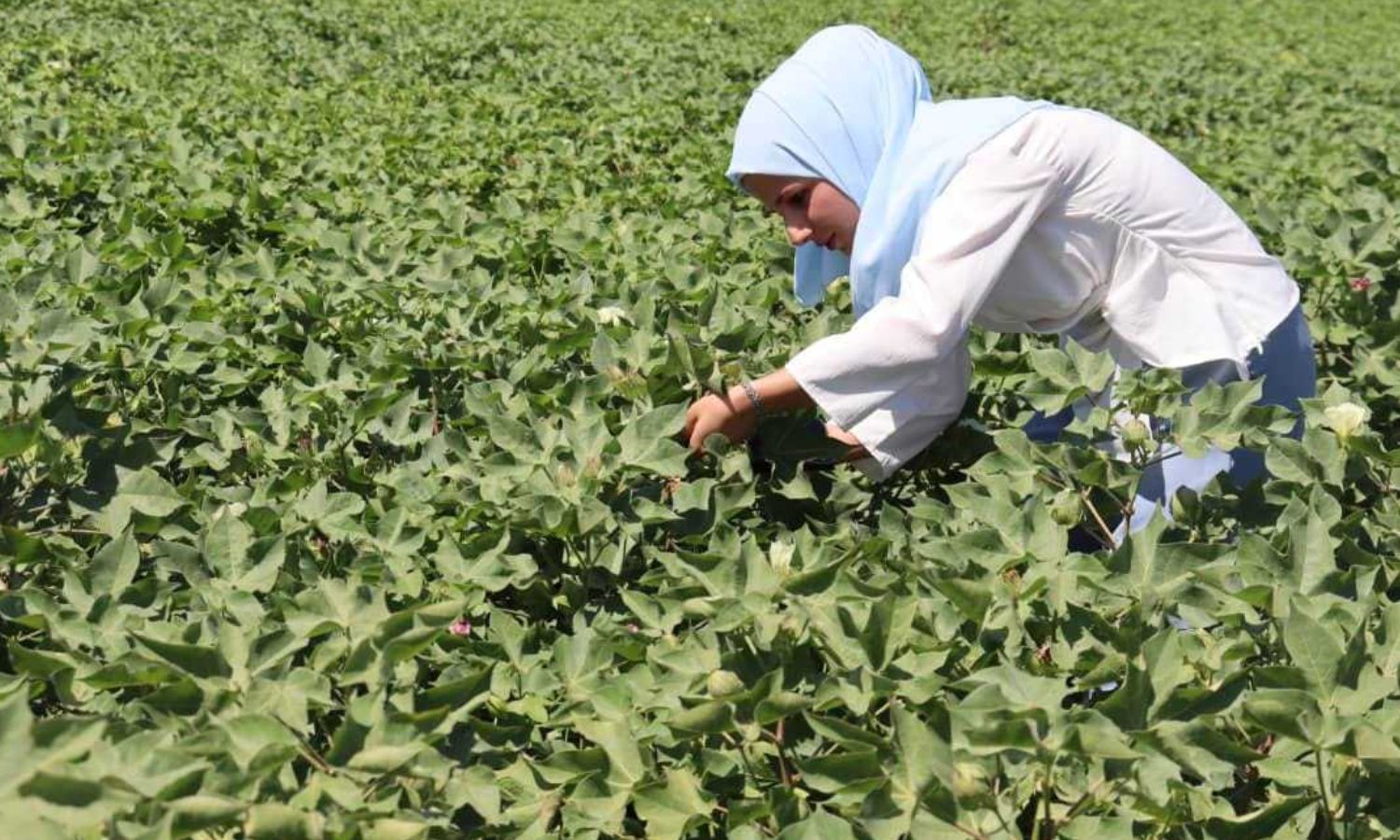



Al-Hasakah – Majd al-Salem
The cotton crop in northeastern al-Hasakah governorate is suffering from severe pressure caused by the inability to secure the quantities of water needed for irrigation, the scarcity of fuel, and the high prices of fertilizer.
Cotton farmers complain about the lack of support provided to them, which threatens the level of production of their crops this season.
Ashraf al-Rashid, 45, from the countryside of the city of Amuda, told Enab Baladi that his crop was almost dying from thirst and high heat, stressing his inability to secure irrigation water due to the scarcity of fuel and its high prices.
Al-Rashid added that the cotton crop needs to be watered 14 times over the course of the crop cycle, while the amount of “subsidized” fuel obtained by the crop’s farmers in the region is only sufficient for five irrigation times.
He explained that during the months of July and August, the crop must be irrigated at least once every 5-7 days, which is no longer possible under the current circumstances.
The lack of “subsidized” fuel distributed by the Autonomous Administration of North and East Syria (AANES) forces farmers to buy diesel from the black market at a price of about 3,000 Syrian pounds per liter, while the Kurdish-led autonomy is supposed to provide it at a price of 525 Syrian pounds per liter.
The AANES has so far provided only five batches of fuel, in addition to the rise in fertilizer prices to about $700 per ton, which increases the costs of agriculture for farmers.
The trading rate of the Syrian pound against $1 reached 13,700, according to the S-P Today currency website.
Ali al-Safook, who owns five hectares planted with cotton in the Tal Hamis area in the southern Qamishli countryside, said that his crop is infected with spiny, American, pink, and green bollworms despite spraying the crop with pesticides.
In addition, his crop suffers from thirst due to the extremely high temperatures that the region is witnessing, as he has been able to water it only seven times so far.
As a result of these circumstances, al-Safook may incur losses of thousands of dollars, according to his estimate, pointing to the urgent need to provide wheat farmers with fuel in a timely manner and to grant pesticides at appropriate prices or on credit until the crop is harvested and sold.
The Directorate of AANES’ Agriculture and Irrigation said on its Facebook account on August 23 that the amount of bollworm infection in the fields of the Tal Hamis area had reached 80% and that it had given the necessary instructions in some fields whose infection rate was lower, without mentioning additional details about the cause of the injury or addressing the needs of farmers.
In turn, the Agriculture Directorate of the regime’s government in al-Hasakah said that the growth of the cotton crop in all areas of agricultural stability is good, and it does not suffer from insect infections except in a narrow and scattered range, according to a statement by the head of the plant production department in the directorate, Jalal Bilal.
Bilal considered that if there were bollworm infestations, they would remain individual, sporadic, and below the economic threshold, which bodes well for “good” production for the current season.
According to the directorate, the area of land cultivated with cotton in al-Hasakah governorate for the current season is 6,135 hectares.
The director of the Cotton Office in the Ministry of Agriculture and Agrarian Reform, Ahmed al-Ali, stated that the area planted with cotton in Syria for this year’s season reached 16,271 hectares last May.
Al-Ali stated in a statement to the official Syrian News Agency (SANA) that the cultivated area in the “unsafe areas” amounted to 11,035 hectares, distributed between Raqqa and al-Hasakah.
Data from the International Production Assessment Division of the US Department of Agriculture show that total production in Syria decreased to 28,000 tons after it was approximately 365,000 tons at the peak of Syria’s production in 2000.
Al-Hasakah-based agricultural engineer Ismail Iskan told Enab Baladi that the condition of the current cotton season ranges between weak and moderate due to the lack of fuel.
This forces the farmer to buy it at high prices, as well as the high cost of fertilizers and pesticides sold in dollars in light of the deteriorating value of the Syrian pound and the infestations of various insect pests, he explained.
Iskan, who owns an agricultural pharmacy in the city, explained that to get rid of the worm pest, farmers must spray specific pesticides, as two pesticides, Deltamethrin and Proclaim, must be mixed and sprayed several times, noting the need for the number of irrigations for the season to reach 11 to 13 times.
According to what Enab Baladi monitored through several farmers in the region, the cotton season is currently in the “boll development” stage, which is a critical stage.
When thirsty, cotton bolls bloom prematurely and wither, causing huge losses to farmers, amid demands to raise cotton prices from last year by at least one US dollar so that the farmer can compensate for losses, pay off debts, and achieve a profit margin.
The Autonomous Administration set the price of purchasing cotton from farmers last year at 4,300 Syrian pounds per kilogram, but the deterioration of the value of the pound since the decision to set the price has exposed farmers to major losses.
if you think the article contain wrong information or you have additional details Send Correction